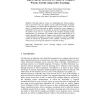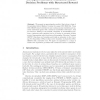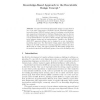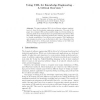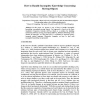113
Voted
KI
2007
Springer
15 years 1 months ago
2007
Springer
Detecting unknown worms is a challenging task. Extant solutions, such as anti-virus tools, rely mainly on prior explicit knowledge of specific worm signatures. As a result, after t...
72
Voted
KI
2007
Springer
15 years 1 months ago
2007
Springer
133
Voted
KI
2007
Springer
15 years 1 months ago
2007
Springer
Abstract. In this paper, we present a system for simultaneous localization and map building of a mobile robot, based on an attentional landmark detector. A biologically motivated a...
110
Voted
KI
2007
Springer
15 years 1 months ago
2007
Springer
We present an approximation method that solves a class of Decentralized hybrid Markov Decision Processes (DEC-HMDPs). These DEC-HMDPs have both discrete and continuous state variab...
86
Voted
KI
2007
Springer
15 years 7 months ago
2007
Springer
Abstract. Rule-based programming paradigm is omnipresent in number of engineering domains. However, there are some fundamental semantical differences between it, and classic progr...
72
Voted
KI
2007
Springer
15 years 7 months ago
2007
Springer
The paper describes the Executable Design Concept which is one of the main components of HeKatE: Hybrid Knowledge Engineering methodology. HeKatE project aims at developing a metho...
85
Voted
KI
2007
Springer
15 years 7 months ago
2007
Springer
Abstract The paper analyzes UML, the well known software engineering tool, from the knowledge engineering perspective. The goal of the paper is to evaluate UML as the possible desi...
110
Voted
KI
2007
Springer
15 years 7 months ago
2007
Springer
Abstract. Knowledge compilation is a common technique for propositional logic knowledge bases. The idea is to transform a given knowledge base into a special normal form ([MR03],[D...
85
Voted
KI
2007
Springer
15 years 7 months ago
2007
Springer
In this paper, we present a way of how to handle incomplete knowledge concerning moving objects. Our approach is based on the basic Qualitative Trajectory Calculus (QTCB), which is...
80
Voted
KI
2007
Springer
15 years 7 months ago
2007
Springer
Behaviour recognition in a video scene consists of several distinct sub-tasks: objects or object parts must be recognised, classified and tracked, qualitative spatial and temporal...
